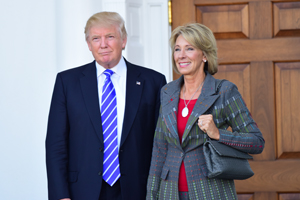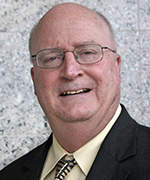In the wake of an unprecedented and extraordinary presidential election, the literacy education community waited intently to learn who would be tapped for the top post at the U.S. Department of Education.
The answer came last month when President-elect Donald Trump announced that Betsy DeVos, a billionaire philanthropist from Michigan, is his enthusiastic choice.
“Under her leadership, we will reform the U.S. education system and break the bureaucracy that is holding our children back, so that we can deliver world-class education and school choice to all families,” Trump said.
 |
| Betsy DeVos |
Accepting the responsibility, DeVos said, “the status quo in education is not acceptable” and added that “together, we can work to make transformational change.”
DeVos, 58, is the daughter of the late Edgar Prince, a wealthy industrialist, and the sister of Erik Prince, the founder of Blackwater, the private security firm that made headlines during the Iraq war.
She is married to Dick DeVos, a one-time Michigan GOP gubernatorial candidate and former president of Amway and the NBA’s Orlando Magic.
Betsy DeVos graduated from Calvin College in Grand Rapids, MI, with a bachelor’s degree in business administration and political science. She would not be the first education secretary without an education degree.
Margaret Spellings, who served as Secretary of Education under George W. Bush, also had a degree in political science, and Richard Riley, who served under Bill Clinton, had a law degree.
As with Spellings and Riley, DeVos also has never worked in the public school system but is the founder and chair of the American Federation for Children, a group that works to expand charter schools and school voucher programs. She has twice led the Michigan GOP, and she and her family have donated millions of dollars to help elect Republican candidates.
However, she did not support Donald Trump during the presidential campaign. As a convention delegate, she voted for Ohio Governor John Kasich.
She does have previous ties to the Vice President-elect, Mike Pence, who expanded Indiana’s school voucher system into one of the largest in the United States while he was governor.
As she explained in an interview with Philanthropy magazine, “What we are trying to do is tear down the mind-set that assigns students to a school based solely on the zip code of their parents’ home.”
When candidate Trump announced his education plan, she commented, “We know that millions of children, mostly low-income and minority children, remain trapped in K–12 schools that are not meeting their needs.”
Many see her nomination as proof that Trump intends to follow through on his campaign pledge to spend $20 billion in block grants to expand private and charter school options for minority children, a prospect that may reignite the debate over making Title I funds portable.
Reactions to the DeVos nomination have predictably split along party lines. Rick Snyder, GOP governor of Michigan, said she will mean great things to Michigan and to the children of the nation.
James Goenner, president of the National Charter Schools Institute, said DeVos was a bold pick, an outspoken advocate for school choice and a challenger for the status quo.
Former Florida governor Jeb Bush described DeVos as a phenomenal, strong woman and expressed his hope that the new administration will usher in an “earthquake” in terms of federal education funding.
However, there has also been harsh criticism of DeVos. American Federation of Teachers head, Randi Weingarten, said Trump has made it loud and clear that his education policy will focus on “privatizing, defunding, and destroying public education in America.”
Lonnie Scott, executive director of the advocacy group Progress Michigan, said the nomination proved that “having a shortage of experience means nothing as long as you don’t have a shortage of money.”
Diane Ravitch of the Network for Public Education issued a battle cry, saying that those who believe education is a public responsibility, not a consumer good, must resist her nomination.
Early next year, the DeVos nomination will go to the Senate Committee on Health, Education, Labor, and Pensions (HELP). Committee Chair, U.S. Sen. Lamar Alexander (R-TN), praised DeVos as an excellent choice “who will be able to implement the Every Student Succeeds Act (ESSA) just as Congress wrote it.”
The ranking member of HELP, U.S. Sen. Patti Murray (D-WA), was less optimistic, noting the president-elect had made a number of troubling statements over the course of the campaign on a range of issues that a future secretary of education will have to address. She promised “a robust hearing process.”
 Dan Mangan is the Director of Public Affairs at the International Literacy Association.
Dan Mangan is the Director of Public Affairs at the International Literacy Association.